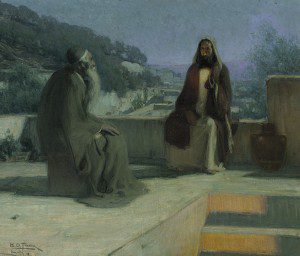
(Henry Ossawa Tanner, 1899)
Click to enlarge.
At least two of the most famous passages in the New Testament occur within this reading. Take John 3:16, for example, which is familiar to every fan of American football: “For God so loved the world, that he gave his only begotten Son, that whosoever believeth in him should not perish, but have everlasting life.”
Three very quick comments:
1.
The Greek word that’s translated in the King James Version as again in the phrase “born again,” is anothen (ἄνωθεν), which can also mean “from above.” (I suppose, in a way, that it’s rather like the English-language musical expression from the top.) I expect that both senses should be kept in mind when reading Christ’s exchange with Nicodemus.
2.
Christ’s declaration in John 3:16-17 really is important enough to emphasize over and over again: “For God so loved the world, that he gave his only begotten Son, that whosoever believeth in him should not perish, but have everlasting life. For God sent not his Son into the world to condemn the world; but that the world through him might be saved.”
Much could be said about it, but one thing seems quite clear to me: These verses are inconsistent with the common Calvinist notion that God never intended to save everybody, that the atonement was designed to be limited in its scope to only the “elect,” and that some (most?) humans were fated from before the creation of the world to be damned. As the apostle Paul says in 1 Timothy 2:4, God “will have all men to be saved, and to come unto the knowledge of the truth.”
3.
Jesus’ description of the workings of the Spirit in John 3:8 reminds me of Christina Rossetti’s simple little poem “The Wind,” which is probably referring to it:
Who has seen the wind?
Neither I nor you.
But when the leaves hang trembling,
The wind is passing through.
Who has seen the wind?
Neither you nor I.
But when the trees bow their heads,
The wind is passing by.
The Spirit is discerned not directly but by its effects, which can often be quite subtle.












